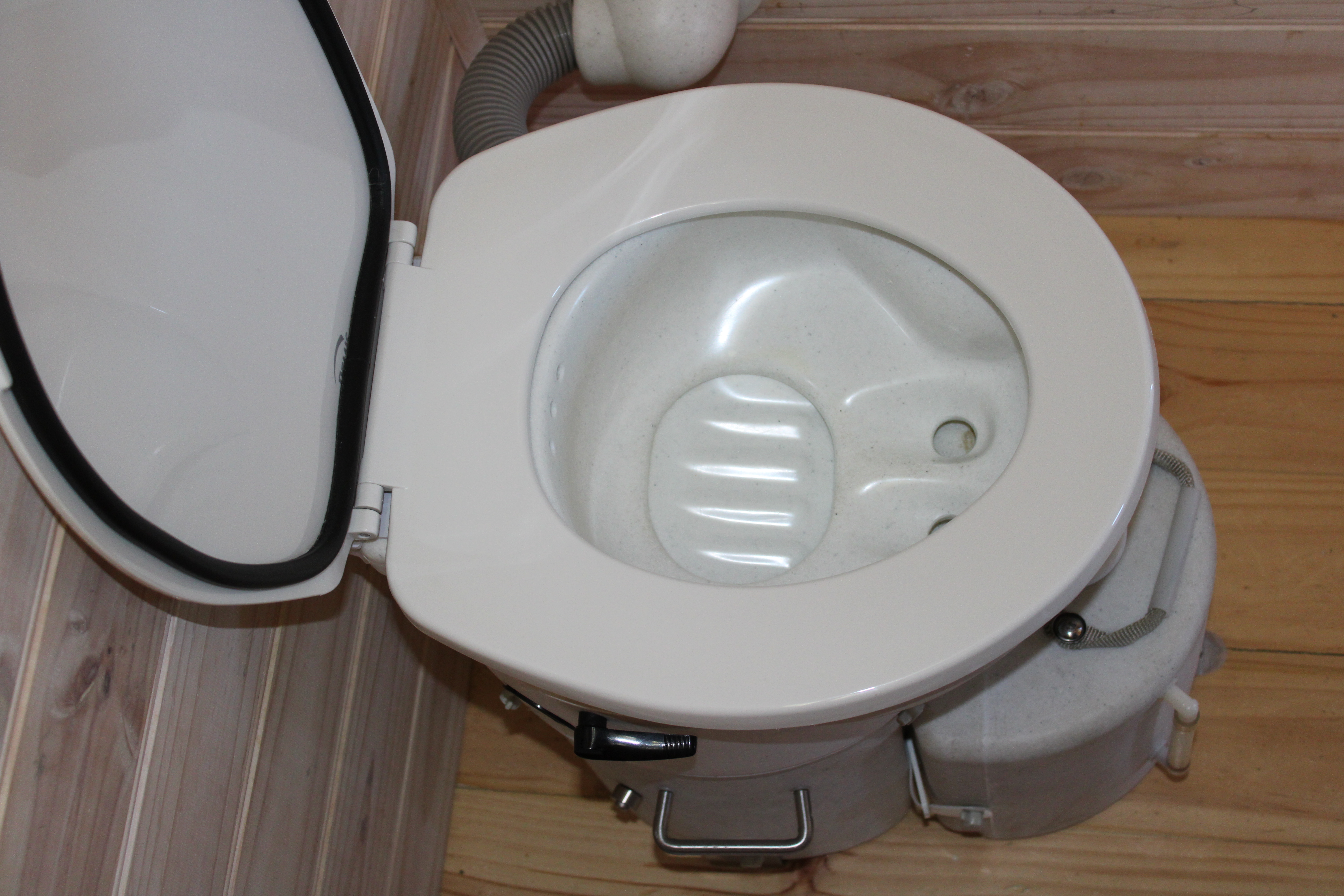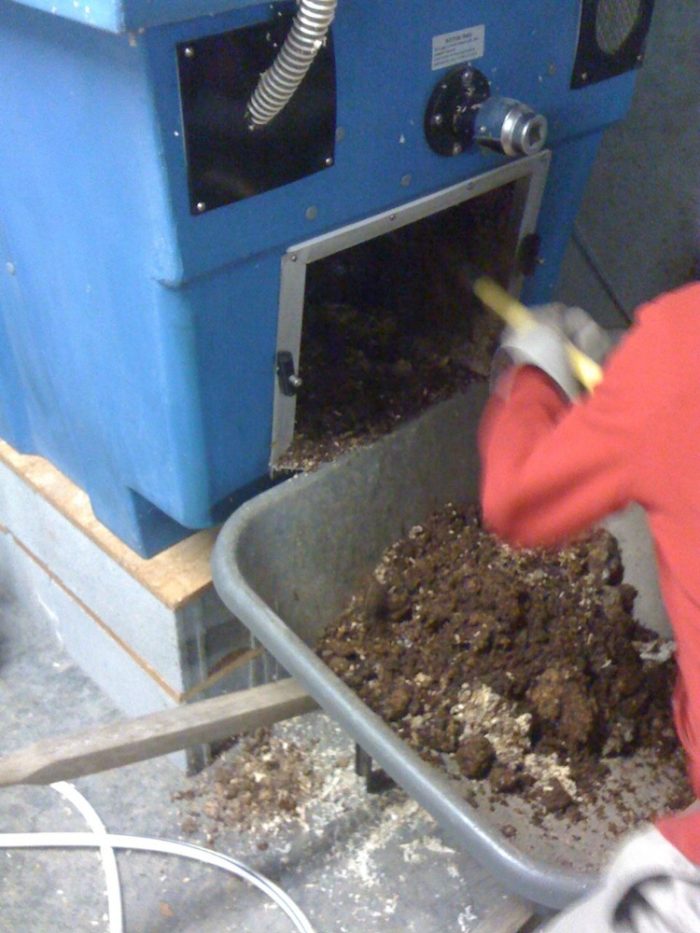Composting toilets, when maintained properly, do not emit unpleasant odors. Regular maintenance and correct use are critical to controlling smells.
Composting toilets present an eco-friendly solution for waste management by transforming human waste into usable compost through a natural decomposition process. They operate using little to no water, which makes them ideal for off-grid living, environmentally sensitive areas, and locations where water is scarce.
The key to an odor-free composting toilet lies in the balance of carbon-rich materials, moisture, and airflow within the unit. An optimally functioning system ensures waste breaks down effectively, preventing the buildup of smells. Users seeking sustainable and cost-effective options find composting toilets an excellent choice, provided they commit to the necessary upkeep that such systems demand.

Credit: www.tiffanythetinyhome.com
The Smell Factor In Composting Toilets
When thinking about composting toilets, the question of smell often arises. The truth may surprise you. Properly maintained composting toilets can be virtually odor-free. Let’s dispel some myths and look at factors that influence odor.
Common Misconceptions
Many people believe that composting toilets are smelly. That’s not true. Composting toilets use natural processes to break down waste. This can eliminate odor when done correctly. Take a look at some widespread misconceptions:
- They smell like portable toilets: Unlike portable toilets, composting toilets separate liquid and solid waste, reducing smell.
- All composting toilets have flies: Well-designed systems prevent flies from accessing waste material.
- They’re too high maintenance: Routine tasks are simple and can prevent odors.
Key Influencers Of Odor
Different factors affect how a composting toilet smells. Balance is crucial for an odor-free experience.
| Factor | Influence on Odor |
|---|---|
| Ventilation | Pulls air out, limiting smell. |
| Air Flow | Keeps the process aerobic, reducing odor. |
| Moisture Control | Prevents excess moisture and associated smells. |
| Regular Maintenance | Removes decomposed material, preventing buildup. |
Maintain balance and your composting toilet can stay fresh and clean. Keep these points in mind for a pleasant bathroom experience.
How Composting Toilets Work
Composting toilets transform waste into useful compost. They use little to no water. This makes them eco-friendly. These toilets do not typically smell if maintained right. Let’s explore how they operate.
The Biological Process
Composting toilets rely on natural processes. They turn human waste into compost. This happens much like a garden composter. Microorganisms break down waste. Oxygen plays a key role here. This compost is clean and non-smelly.
- Microbes work on waste. They need the right balance to thrive.
- Carbon-rich materials help. Think sawdust or peat moss. They balance moisture.
- Regularly mixing the contents speeds up decomposition.
Ventilation Systems
Ventilation is crucial. It removes odors. It helps microorganisms breathe. Most composting toilets have a built-in fan. This fan pulls air up and out through a vent pipe. Odor and moisture leave with the air. Proper ventilation means a smell-free toilet.
Here’s how effective ventilation works:
- Air flows from the toilet to the vent pipe.
- The fan assists air movement, reducing smells.
- Fresh air enters to aid composting.
Regular maintenance keeps the system odorless. Follow the guidelines for your model. This will ensure a fresh-smelling bathroom.
Best Practices For Odor-free Composting Toilets
Imagine your eco-friendly home, complete with a composting toilet that helps the planet. But there is one question: Do composting toilets smell? The answer is no, as long as you follow best practices for keeping them odor-free. Let’s dive into how you can maintain a fresh and clean composting toilet with proper usage, regular maintenance, and a balanced compost mix.
Appropriate Usage
The key to a no-smell composting toilet starts with how you use it. Only put human waste and toilet paper into it. Anything else might mess up the composting process.
- Avoid chemicals and trash.
- Direct urine to a separate container if possible.
Regular Maintenance
Like any toilet, a composting one needs cleaning. Cleaning and emptying it on time keeps bad smells away.
| Cleaning Task | Frequency |
|---|---|
| Empty urine container | Every 1-3 days |
| Check moisture levels | Weekly |
| Empty compost bin | Monthly or as needed |
Balance Of Green And Brown Materials
For compost to break down well, you need a mix of green (nitrogen-rich) and brown (carbon-rich) materials.
- Green materials: food scraps and fresh plant matter.
- Brown materials: leaves, paper, and sawdust.
Aim for the right balance to avoid smells. Add more brown materials if it gets too wet or smelly.

Credit: fredstinyhouses.com.au
Comparing Traditional To Composting Toilets
When choosing the right toilet for a home or off-grid setup, two popular options come to mind: traditional and composting toilets. Many homeowners wonder about the differences, especially regarding odor control. Let’s explore how these two toilet systems stack up against each other.
Differences In Design
How traditional toilets and composting toilets are built affects their functionality and maintenance. Traditional toilets use water to flush waste into a sewer system or septic tank. Composting toilets, on the other hand, rely on a natural process to break down waste into compost.
| Traditional Toilet | Composting Toilet |
|---|---|
| Requires plumbing | No plumbing needed |
| Uses water to flush | Dry system |
| Depends on sewer or septic | Self-contained unit |
Impact on Smell
Impact On Smell
The fear of foul odors makes people hesitant about composting toilets. Surprisingly, composting toilets often smell less than traditional ones. The key is their ventilation system. Good airflow helps compost break down waste odor-free. In contrast, traditional toilets can emit sewage smells if not maintained properly.
- Composting toilets use ventilation to minimize odors.
- Traditional toilets can have sewage related smells.
- Regular maintenance is crucial for both types.
Advancements In Composting Toilet Technology
If you think composting toilets are a relic of the past, think again. Innovations in this field have measurably reduced odor concerns. These modern units transform waste into compost with little to no smell. Let’s delve into the advancements making composting toilets a breath of fresh air.
Innovations Reducing Odor
The breakthroughs in composting toilet systems are impressive. Each design feature plays a critical role in minimizing odor. Here’s what new technology offers:
- Advanced Ventilation Systems: Airflow is key. Built-in fans expel odors and accelerate composting.
- Sealed Compartments: They lock in waste and prevent smells from escaping.
- Bio-Enzymes: These additives break down waste faster, which reduces smell.
With these upgrades, a properly maintained composting toilet smells less than a typical flush toilet.
Future Outlook
Looking ahead, the outlook for composting toilets is promising. The focus is on sustainability and innovation. Future models may feature:
- Smart Sensors: Devices to monitor compost levels and moisture for optimal performance.
- Improved Seals: Next-generation gaskets to ensure even better odor containment.
- Greener Materials: Use of recycled and biodegradable materials in construction.
As technology grows, expect to see smarter, even more odor-free composting toilets. They’re not just good for the environment; they’re becoming a smart choice for any modern home.

Credit: www.greenbuildingadvisor.com
User Experiences With Composting Toilets
Many people wonder about the smell factor when considering composting toilets. User experiences can shed light on this common concern.
Testimonials And Case Studies
Real-life users of composting toilets share their stories. They confirm that proper maintenance leads to odorless bathrooms. Here’s what they say:
- No foul smells, just earthy aromas, as reported by a family using a composting toilet for over a year.
- Regular users stress the importance of following instructions and using the right balance of materials.
- A couple living off-grid describes their composting toilet as a simple, clean solution after initial doubts.
- In contrast, one user had a negative experience due to lack of ventilation. They learned that proper installation is crucial.
Handling Varied Climates And Settings
| Climate/Setting | User Experience |
|---|---|
| Humid Tropical | More frequent maintenance needed, but still odor-free living. |
| Desert Dry | Less moisture means ease of use and less odor. |
| Temperate | Users enjoy a balance in maintenance and performance. |
| RVs/Mobile Homes | With limited space, ventilation and carbon cover materials are key. |
Across different climates, composting toilets perform well with the right care. Users emphasize the need to adapt their approach to local conditions.
Frequently Asked Questions Of Do Composting Toilets Smell
How Do You Keep A Compost Toilet From Smelling?
To prevent compost toilet odor, maintain proper balance of carbon-rich materials, ensure adequate ventilation, regularly empty solids, and use a suitable cover material after each use. Regular cleaning is also essential for odor control.
What Is The Disadvantage Of Compost Toilet?
Compost toilets may require frequent maintenance and can produce unpleasant odors if not managed properly. Their suitability varies with climate conditions and they may not be ideal for high-traffic areas.
How Much Do Composting Toilets Smell?
Composting toilets typically emit minimal odor due to aerobic decomposition and proper ventilation systems. Regular maintenance ensures they remain nearly odor-free.
What Is The Least Smelly Composting Toilet?
The least smelly composting toilet is typically a dry model with a well-managed ventilation system to minimize odor.
Do Composting Toilets Emit Odors?
Composting toilets are designed to minimize odors by properly balancing carbon, nitrogen, moisture, and airflow, making them generally smell-free when maintained correctly.
Can Maintenance Affect Composting Toilet Smell?
Regular maintenance, including adding carbon-rich materials and ensuring proper airflow, is crucial in preventing unpleasant smells in composting toilets.
What Causes Bad Smells In Compost Toilets?
Bad smells in compost toilets can arise from imbalances in moisture, inadequate ventilation, or incorrect balance of composting materials.
Are Composting Toilets Hygienic?
Composting toilets are hygienic as they decompose waste into harmless end-products when operated following the manufacturer’s guidelines for use and maintenance.
How Often To Empty Composting Toilets?
The frequency of emptying a composting toilet depends on its size and the number of users but typically ranges from several weeks to months.
Do Composting Toilets Work Off-grid?
Composting toilets are an excellent solution for off-grid living as they often require no water or electricity, relying on natural processes instead.
Conclusion
Dispelling the myth, composting toilets maintain a fresh atmosphere with proper care, not a hint of odor. Embrace eco-friendly solutions, and bid farewell to odor concerns. Trust in effective waste management systems for a greener, cleaner tomorrow. Your switch to sustainability need not compromise comfort or cleanliness.
